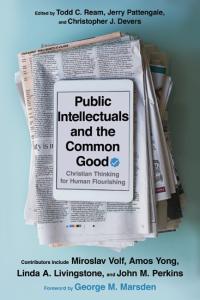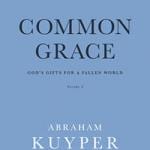
In political circles, there has been a lot of talk about the place (and value, depending on who is doing the talking) of “common-good conservatism.” While this isn’t the place to dig into that particular discussion, this is the place to at least briefly reflect on whether Christians bring anything to the table in the discussion of the “common good.” This question is raised for intellectuals in the new book Public Intellectuals and the Common Good, edited by Todd Ream, Jerry Pattengale, and Christopher Devers.
Public Intellectuals and the Common Good is a collection of essays by noted Christian public intellectuals such as Miroslav Volf, John Perkins, and Katelyn Beaty. The first set of essays reflect theologically on the role of the intellectual in publicly pursuing the common good (reasonably enough). The second set raises the question of how to do that within specific professions. The third and concluding set of essays involve personal reflection on how the common good ought to influence our approach to the common good. As with any collection of essays, some are stronger than others in terms of content and quality, but compared to most essay collections this one is generally well-written and interesting. You’ll find much material for reflection here.
What you won’t find–and probably shouldn’t expect to find–is a solution to the problem that every attempt of a Christian to wrestle with the common good must always run into and, ultimately, founder upon: the problem of defining the common good in a way that is true to the Christian faith and applies to the whole world. This is not a new problem. It goes back to Scripture, and was first (and best) wrestled with in detail by Augustine in City of God. To over-simplify the problem, Christianity teaches that the “common good” of all human beings is a restored relationship with God and with each other. These can only be achieved through the reconciliation that comes by means of faith alone in the Gospel of Jesus Christ, but these will also only be achieved in the ultimate sense after Christ returns. The world does not agree with this as a description of “the common good.” (Nor should we expect the world to agree with it, if it did it wouldn’t be classified as “the world.”)
Now, this difference doesn’t mean that Christians can’t live in/work with the world. We must live in and work with the world. But it does mean that when Christians are working on, well, anything–criminal justice reform, voting rights, election integrity, alleviating poverty, etc, etc, etc–in our view we are always working on issues of secondary importance. That isn’t to say that those issues aren’t important at all (I happen to think some of them are very important). Just that we are going into those situations from a perspective that is already going to differ from that of those with whom we work.
Again, Public Intellectuals and the Common Good doesn’t directly engage this tension. Instead, it just assumes (rightly) that we can work together and be a blessing to the world with our thought, words, and service. Intellectuals have an obligation not to withdraw into monastic isolation, but rather to step into the needs of the world with a desire to serve while evangelizing. And to that end, Public Intellectuals and the Common Good is a helpful guide to what that might look like.
Dr. Coyle Neal is co-host of the City of Man Podcast an Amazon Associate (which is linked in this blog), and an Associate Professor of Political Science at Southwest Baptist University in Bolivar, MO











